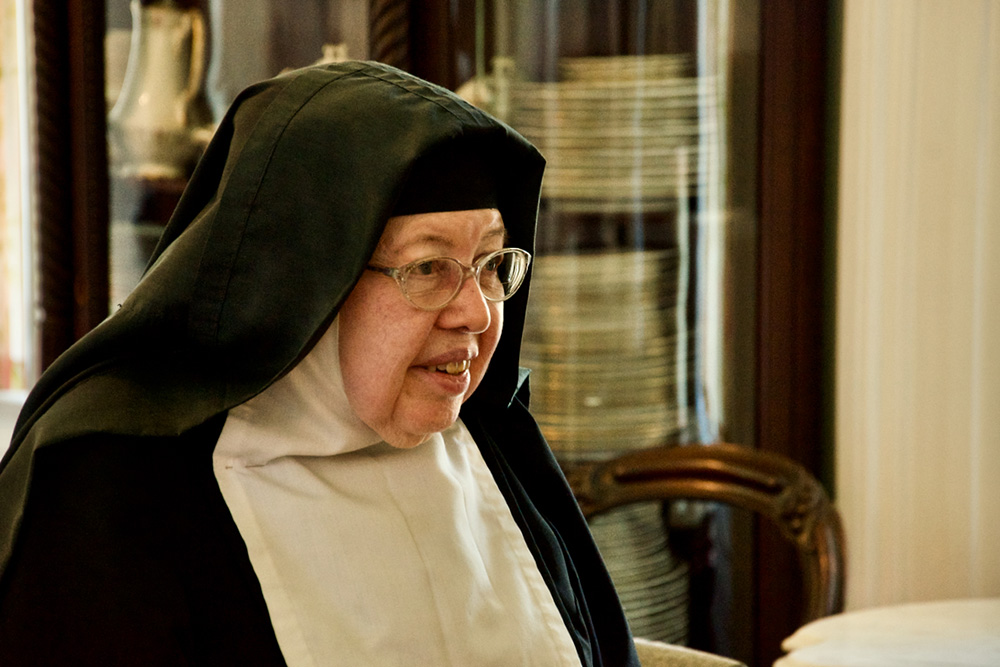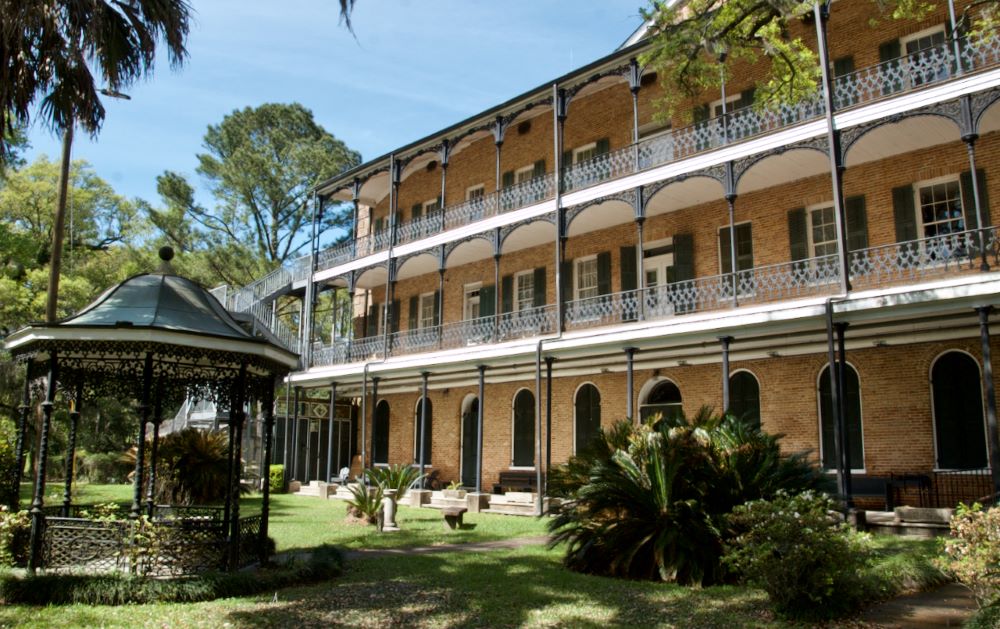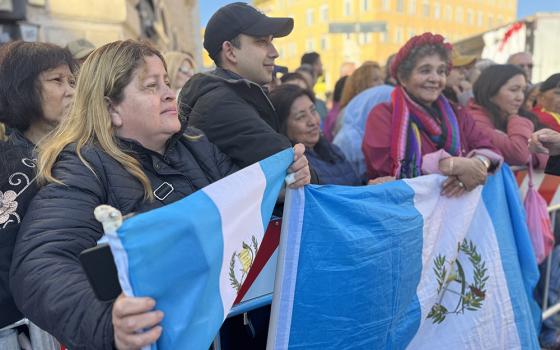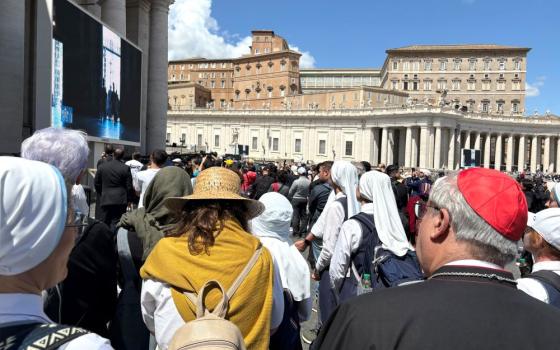
Sr. Rose Marie Kinsella at the Visitation Monastery in Mobile, Alabama, on March 14, 2023. Kinsella joined the Visitation Sisters almost by accident, as she meant to visit a Carmelite Monastery in 1965 but was taken to the wrong convent. (GSR photo/Dan Stockman)
Turn off the busy, four-lane road in the heart of Mobile, Alabama, through the gate and onto the grounds of the Visitation Monastery and you enter a different world.
The outer walls surrounding the monastery block out most of the noise of the traffic, and the spreading oaks, dripping with Spanish moss, absorb the rest as they form a canopy over the gardens between the large stone chapel and an ornate three-story building in the Creole townhouse style that dominates older buildings on the Gulf Coast.
Even in the shade, the Alabama air is warm, but inside the darkened convent it is cool and time seems to slow down. Sr. Rose Marie Kinsella appears in the parlor and is soon talking about the rhythm of the contemplative order's days, which are dominated by prayer and often silence. Aside from the grille being open on the barrier that divides the nuns from the public, it might be 1940 or any year since.
Life moves differently here.
"We're not really conscious of age," Kinsella says, and it is easy to believe.
The fact that Kinsella is here is either an accident or Divine Providence, depending on how you see things. The 21 other Mobile Visitation Sisters, no doubt, see it as providential.

The Visitation Monastery in Mobile, Alabama, in March. The building originally housed the order's school but has been a retreat center since the 1950s. (GSR photo/Dan Stockman)
In 1965, she was just finishing up a two-year stint in the U.S. Army, and was trying to visit an order of Carmelites in Mobile to see about joining them. But the cab driver — unbeknownst to Kinsella — dropped her off at the Visitation Sisters' convent instead. It was dark, near midnight, and began raining as the cab drove away, and the nun who answered the door to admit Kinsella — still in her Army uniform — was named Sr. Mary Carmel.
"So I knew I was at the Carmelite monastery," she said.
Nearly 60 years later, Kinsella says she ended up at the right place after all.
"I didn't really choose it," she said, "it was chosen for me."
GSR: How did you go from the Army to contemplative religious life?
Kinsella: I grew up near Syracuse, New York, and a group of five or six Irish Franciscans from Boston lived halfway between our house and the church, and I would walk with them. And my cousin was a Sister of Charity in New Jersey. So I knew and loved sisters.
But I couldn't decide whether to be a teacher or a sister. I was young and didn't know you could be both. In college, I read about St. Thérèse of Lisieux, who was more contemplative, and I thought that if you were a teacher you would have to give yourself wholly to that, so I wouldn't be able to be a sister, too. And when I read the life of St. Thérèse, I thought, "Well that's what I'd really like."
Advertisement
I was graduating from college, but I had no desire for graduate school, so I went into the Army. It was only a two-year commitment, and I had a college degree so I went in as an officer. My parents weren't prepared for that. They weren't upset, because they knew I was still searching for what I wanted to do, but they were surprised.
I was stationed at Fort McClellan, so that's how I got to Alabama. The chaplain said there were sisters in Mobile I could visit, and arranged for me to fly down here to visit. I thought I was going to meet the Carmelites.
When did you know you were at the wrong convent?
I started to worry that night when the sister pointed to the meeting area and said "Over at the Carmel, you can't open the curtains unless it's family visiting." But it was night and the cab had already left, so I wasn't about to tell them I might be in the wrong place.
I had made a retreat in Atlanta, and the leader told me about the Visitation Sisters in Mobile and that they held retreats, but I dismissed it because that's not what I thought of as contemplative life. So when the sister here told me the next day that they host retreats, I thought, "Oh my goodness, I'm in the very place I didn't want to go to." So I said I'd better pray about it.
I prayed in the chapel before the Blessed Sacrament, and I said to God, "How did I get here?"

Sr. Rose Marie Kinsella at the Visitation Monastery in Mobile, Alabama (GSR photo/Dan Stockman)
And he said, "Maybe I want you here."
In the Army, I was working with trainees and after three or four weeks a lot of them would want to drop out, and I would always tell them, "Just give it six weeks and see," knowing that after six weeks they would probably stay two more for graduation. So I thought, "I'd better take my own advice and give it a chance."
I said, "God, if this isn't what you want, you better give me a sign." He never did.
It just worked out. They said I could come down any time I wanted, so after I got out of the Army, I went home for a couple of weeks to see my family. Joining the convent, that was harder for my parents than going into the Army. The Army was something they took in stride, but when I came here, that was different because it meant I wouldn't be coming home again.
I was very comfortable with the Visitation spirituality, and once I entered, everything was fine.
What is life like here, with this mix of a contemplative life closed off from the outside world, and constantly hosting retreats, where the outside world is coming in?
We have three to four hours of prayer a day in our schedule, and of course I pray outside of those times. I might be ironing or cleaning and I at least try to be reflective.
People thinking contemplative life is nothing but prayer, that's based on a misconception. It's more like a home life with a family. We cook and clean and iron and maintain this place and get repairs made. It's like maintaining a household.
The retreat house has groups almost every weekend. A lot of them are silent retreats, but it means every day is different, because you have to adjust when they're going to use the chapel, etc. They usually have Mass and different times than we do, and sometimes we're free to go to Mass with them, but sometimes we're too busy. I like to go when I can.
We lead a regular life. I'm happy with it.






